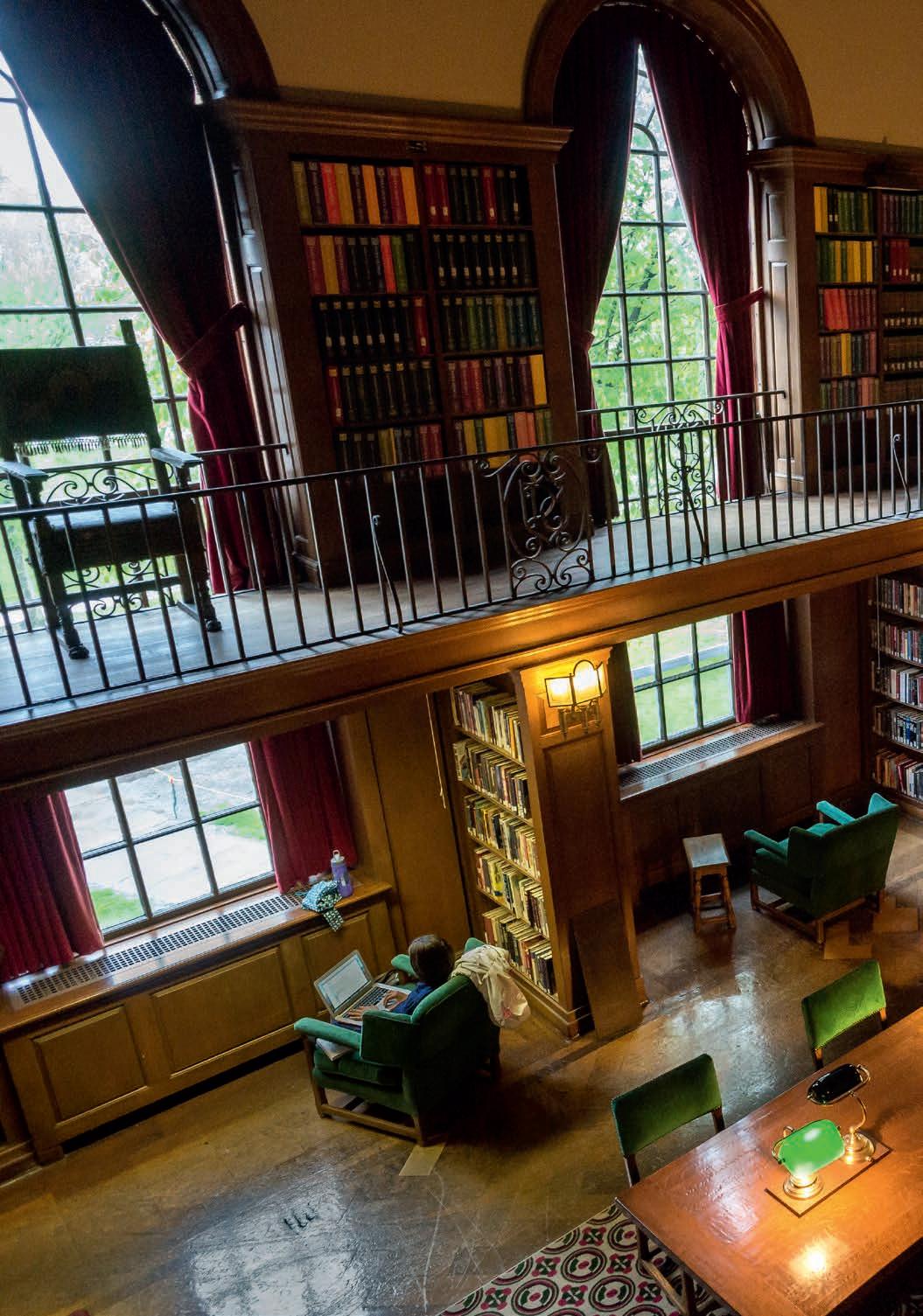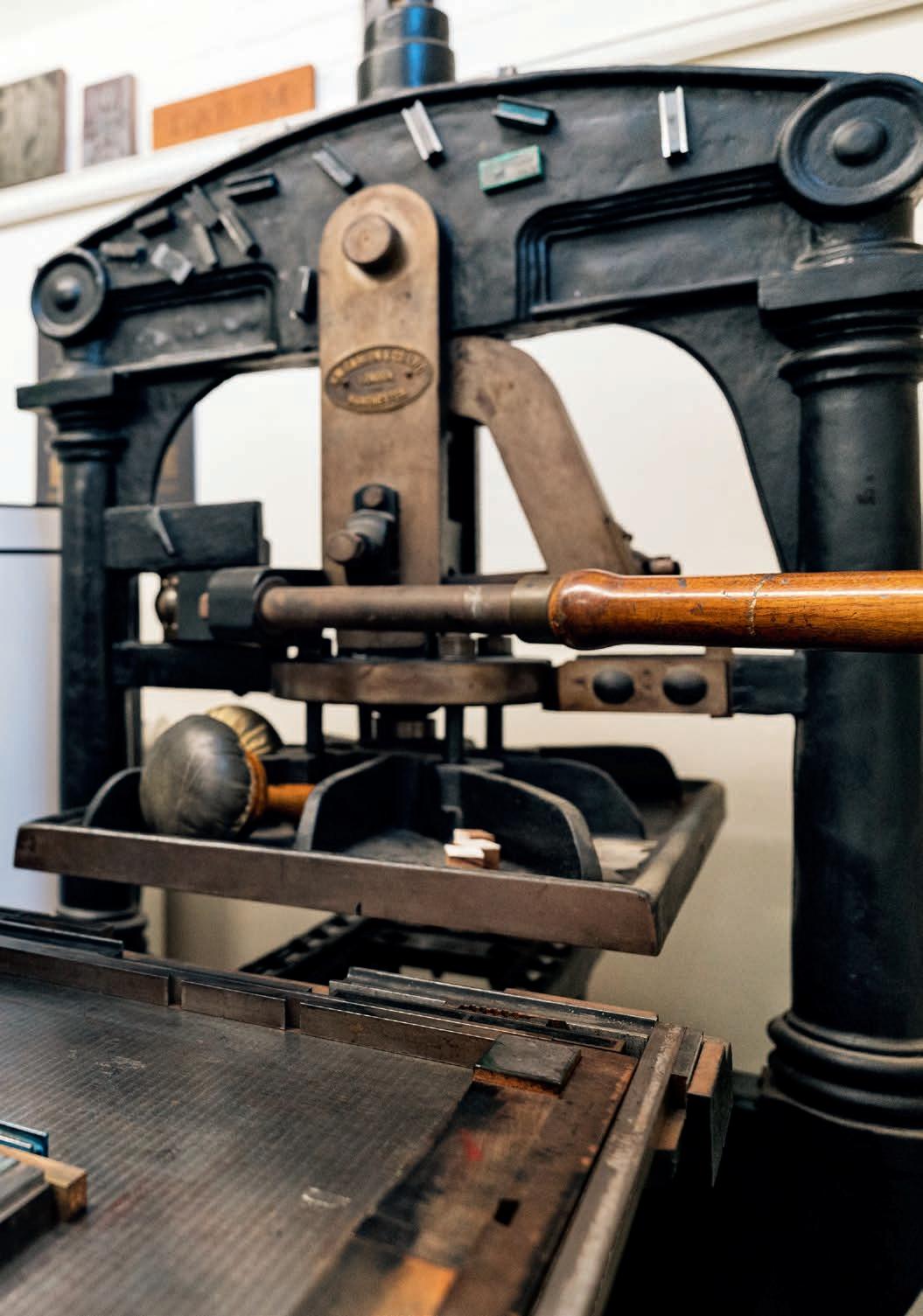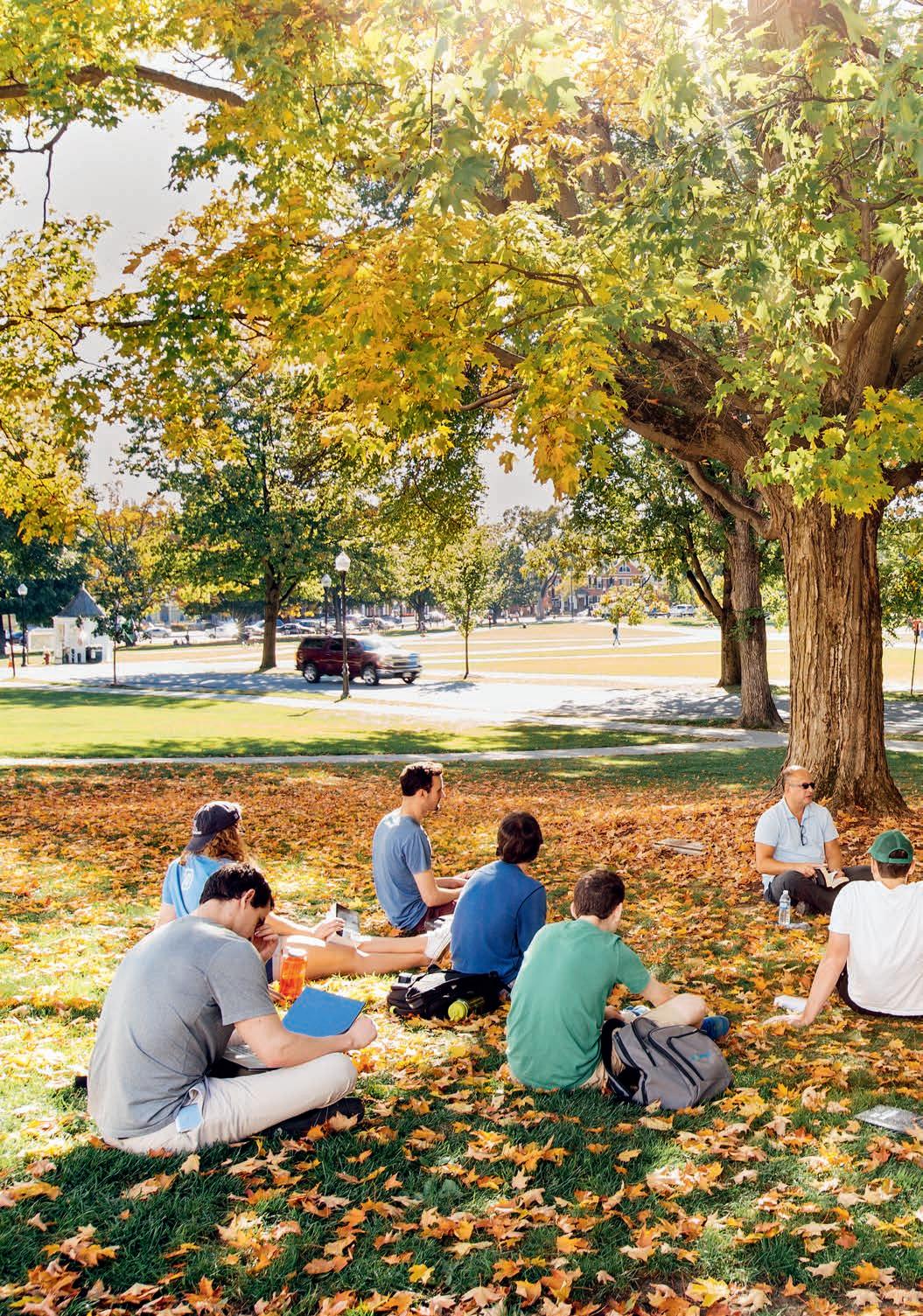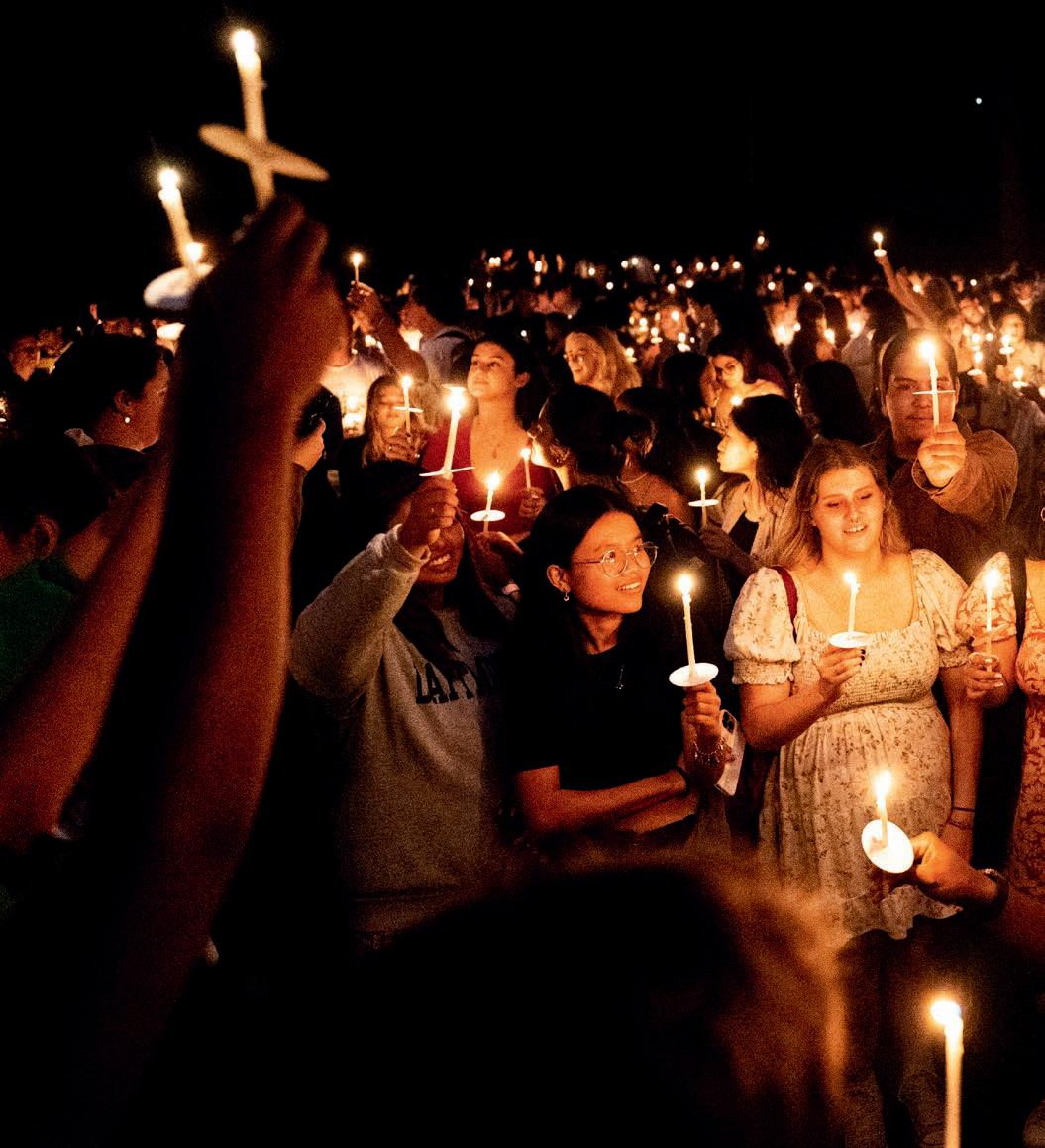A PROFOUND SENSE OF PLACE. A PROFOUND SENSE OF PURPOSE.

TAKE A WALK amongst the towering pines of our College in the woods. Explore widely. Breathe deeply. Let’s help you make the most of your visit to Hanover.
Founded in 1769, Dartmouth College sits on traditional, unceded Abenaki homelands.
BEYOND THE TOUR
• A 15-minute walk from the Green, Ledyard Canoe Club rents kayaks, canoes, and stand-up paddleboards for a day of fun on the Connecticut River.

• The Appalachian Trail—the mountainous path that extends almost 2,200 miles from Georgia to Maine— passes right through downtown Hanover.
• Enjoy a walk or run around Occom Pond—named for Samson Occom, a member of the Mohegan tribe who was instrumental in raising funds for the founding of the College.
• Shattuck Observatory, the oldest scientific building on campus, offers public observing of Hanover’s starry night skies on some Friday evenings.
WELCOME TO DARTMOUTH. ARE YOU READY
DARTMOUTH. TO DIVE IN?

DO YOU SEEK A EMBRACES “AND,”
DARTMOUTH IS A FUSION of a renowned liberal arts college and a robust research university where students, faculty, and staff partner to take on the world’s greatest challenges. The College has more than 40 undergraduate academic departments and programs as well as four graduate and professional schools: the Tuck School of Business, Dartmouth Engineering, the Geisel School of Medicine, and the Guarini School of Graduate and Advanced Studies. All undergraduate applicants apply to the College of Arts and Sciences and have up to two years to declare a major. At Dartmouth, seemingly unrelated disciplines become natural partners: students are artists and engineers; researchers and athletes; poets and entrepreneurs.

PLACE THAT “AND,” NOT “OR”?
BEYOND THE TOUR
• Pictured here, the Tower Room in Baker-Berry Library offers stunning views of the Green from its velvet armchairs.

• The Magnuson Center for Entrepreneurship, located within the Engineering and Computer Science Center (ECSC) at campus’s West End, is an incubator for student, faculty, and alumni innovation at the local and global level.
• Stop by Cummings Hall to see the vast display of patents received by students, staff, and faculty for inventions developed at Dartmouth Engineering.
DARTMOUTH’S LIBERAL ARTS CURRICULUM teaches students how to think, not what to think. Students declare a major by sophomore year, but the classes they take span disciplines far outside their chosen concentration. And our iconic location is infused in the classroom at every turn—whether studying local food and energy systems at the Dartmouth Organic Farm, examining Shakespeare’s first folio at Rauner Special Collections Library, or shaking hands with presidential candidates visiting Hanover on the campaign trail. How will you explore?
HOW WOULD YOU COURSE OF STUDY?

YOU CHART YOUR STUDY?
BEYOND THE TOUR
• Three miles north of campus you’ll find the Dartmouth Organic Farm, a 220-acre patchwork of land home to greenhouses, gardens, and beehives.
• Pictured here, the Book Arts Workshop offers community members the opportunity to explore the arts of bookbinding, printing, and typography.
• The Hood Museum of Art’s encyclopedic collection is one of the largest of its kind in the country, comprising more than 65,000 works. Take a look for yourself during the museum’s open hours; admission is free.

WHICH SCHOLARS BECOME YOUR MENTORS?

DARTMOUTH FACULTY are award-winning poets, patent-holding engineers, biologists conducting groundbreaking vaccine research, and more—but first and foremost, they love to teach. Dartmouth students don’t just learn from these leading researchers; they become equal investigators in their work, often publish scholarly findings together, and count them as lifelong mentors in and out of the classroom.
SCHOLARS WILL MENTORS?
BEYOND THE TOUR
• The Nelson A. Rockefeller Center for Public Policy and Social Sciences is a hub for public policy research and leadership development on campus.
• At the Digital Applied Learning and Innovation (DALI) Lab, students and faculty design and build mobile applications, websites, digital installations, and more.
• Dartmouth’s Take a Faculty Member to Breakfast or Lunch program allows students and professors to enjoy a meal together at a Hanover restaurant free of charge.

THANKS TO DARTMOUTH’S distinctive year-round quarter system—the D-Plan—students customize their own academic calendars across four years. Dartmouth offers four, 10-week academic terms per year that align with the four seasons. Within some guidelines, students choose how—and where—they’ll spend each of those terms, whether taking classes in Hanover, studying away on an off-campus program, or embarking on a leave term to pursue an internship, research, creative pursuit, or time off. The result? An academic experience that’s tailor-made for you, by you.
The Stretch—a storied off-campus program offered by the Department of Earth Sciences—engages students in field-based data collection on a two-month traverse of the western United States and Canada.

BEYOND THE TOUR
• The Dickey Center for International Understanding sets out to create global citizens who address the world’s challenges—through excellence in education, research funding, and hosting renowned global policy scholars.
• The Dartmouth Center for Social Impact (DSCI) prepares Dartmouth students to become transformative leaders for the common good through social impact work in the Upper Valley of New Hampshire and beyond.
• Designated a national historic landmark in 2013, The Epic of American Civilization is a sprawling 24-panel mural painted in the 1930s by Mexican artist José Clemente Orozco. See it for yourself in the Orozco Room in Baker Library.
WHERE IN THE WORLD WILL YOU ROAM?
WORLD ROAM?

ARE YOU THE ADVENTURESOME

DARTMOUTH STUDENTS are bold, inventive, and curious. They embrace challenges with a signature adventuresome spirit. Find them jumping into an icy Occom Pond during the College’s annual Winter Carnival celebration; pitching their start-up to a board of investors through the Magnuson Center for Entrepreneurship; competing at the Olympics; learning a new language via the Rassias method, Dartmouth’s signature language-learning curriculum; or trying their hand at white-water rafting. What’s your idea of fun?
BEYOND THE TOUR
• A focal point of Dartmouth’s arts district, the Hopkins Center for the Arts hosts year-round programming featuring visionary artists, music and dance showcases, plays, and much more. The Hop is currently undergoing an 88-million dollar renovation and will reopen in 2025.

• The Collis Center for Student Involvement on the edge of the Green is a vibrant hub for student life. Stop by to grab a bite to eat, see a concert or comedy show, and learn about Dartmouth’s more than 160 student organizations.
• Dartmouth has dozens of facilities across campus that support its Division I athletics program, club sports, and intramural leagues. Looking for a place to start? Check out Alumni Gymnasium, the centerpiece of Dartmouth’s athletics complex.
ADVENTURESOME TYPE?
DARTMOUTH ALUMNI LOVE DARTMOUTH, and they draw upon all that they learned in Hanover to tackle some of the world’s biggest problems. Tap into your network of over 80,000 active alumni across the globe who are eager to share in your Dartmouth experience and provide wisdom along the way. And when you join their ranks, you’ll be in good company: just a few of our distinguished alumni include CNN anchor Jake Tapper ’91; actress and comedienne Mindy Kaling ’01; screenwriter and producer Shonda Rhimes ’91; former Solicitor General of the United States Neal Katyal ’91; and Pulitzer Prize-winning author Louise Erdrich ’76.

HOW WILL YOU DARTMOUTH INTO
BEYOND THE TOUR
• The Center for Professional Development supports students in developing their career interests, applying for jobs and internships, and networking with Dartmouth’s more than 80,000 active alumni.
• Located side-by-side in Baker-Berry Library, the Academic Skills Center (ASC) and Student Wellness Center (SWC) support students in their academic pursuits and help them foster well-being in every aspect of life.

CARRY INTO THE WORLD?
4,458 20 7:1 60% 80%
STUDENTS
FEWER IN THE MAJORITY OF CLASSES
ARE YOU READY A VIBRANT COMMUNITY?

UNDERGRADUATE
STUDENTS OR
STUDENT TO FACULTY RATIO CONDUCT RESEARCH UNDERTAKE AN INTERNSHIP
STUDY OFF-CAMPUS
95% 6 55+ % 95+ 70+ 6-YEAR GRADUATION RATE
RESIDENTIAL HOUSE COMMUNITIES
TO JOIN COMMUNITY?
LANGUAGES SPOKEN AMONG THE STUDENT BODY
TRIBAL NATIONS AND INDIGENOUS COMMUNITIES REPRESENTED

NEED-BLIND
Dartmouth reviews applications without regard for your family’s ability or inability to pay for your education, regardless of citizenship status or income.
100% DEMONSTRATED NEED MET
Dartmouth will meet 100% of a student’s demonstrated need for all four years. The average scholarship for a member of the Class of 2026 is $67,127 an amount that equals 80% of the cost of attendance.

NO REQUIRED LOANS
Dartmouth will not include required loans as part of the financial aid award created to meet a student’s demonstrated financial need.
NEED-BASED AND NEED-BLIND FOR
$0 PARENT CONTRIBUTION
Families that earn $65,000 or less and possess typical assets have a $0 expected parent contribution.
AID TRAVELS WITH YOU
Students receiving need-based financial aid pay the same net price for a term on a Dartmouth off-campus study program as they would for a term in Hanover.

HEALTH INSURANCE COVERAGE
Dartmouth will provide scholarship assistance for financial aid recipients toward the cost of Dartmouth’s healthcare plan.
AND FOR ALL
Dartmouth College Office of Undergraduate Admissions
6016 McNutt Hall
Hanover, NH 03755
TAKE HANOVER HOME WITH YOU
Our social media channels capture daily life at Dartmouth year-round.
Student Blog: dartgo.org/blog
Instagram: @ dartmouthadmissions
Facebook: @ dartmouthadmissions

YouTube: dartgo.org/admissionsYT
Podcast: dartgo.org/admissionsbeat
Scan to continue exploring campus beyond the tour.




















